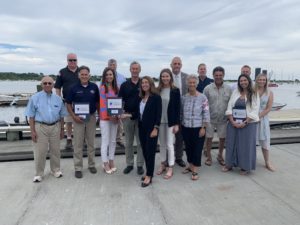Who is a member?
Our members are the local governments of Massachusetts and their elected and appointed leadership.

Lt. Gov. Karyn Polito (center) announces seaport grants at the Chatham Harbormaster Building. Also pictured (3rd from left) is Chatham Town Manager Jill Goldsmith, whose town received $1 million to address structural and public safety issues at the Municipal Fish Pier.
On July 26 in Chatham, the Baker-Polito administration announced nearly $10.8 million in Seaport Economic Council grants for 19 projects.
The grants will help coastal communities advance projects that benefit commercial maritime industries, improve resident and visitor access to waterfront assets, mitigate the impacts of climate change, and advance future dredging.
The grants were approved at a meeting of the Seaport Economic Council, chaired by Lt. Gov. Karyn Polito, at the Chatham Harbormaster Building. Polito said the council selected projects “that will deepen our maritime economy, promote economic development, and support resilient infrastructure in our coastal communities.”
The Seaport Economic Council serves all 78 of the Commonwealth’s coastal communities and awards grant funding to municipalities and other entities in support of projects that promote job creation and economic growth, transformative public-private partnerships, educational opportunities for young people, local economic development planning efforts, coastal infrastructure improvements, and the planning and permitting of saltwater dredging.
With this latest round, the council has invested nearly $77 million through 164 grants in 54 coastal communities since 2015.
“Our waterfronts are economic drivers for Massachusetts, supporting maritime industries and drawing visitors to enjoy our beaches and local businesses,” said Housing and Economic Development Secretary Mike Kennealy. “Providing the resources to shore up our waterfronts through infrastructure improvements and coastal resiliency efforts is integral to both the long-term environmental and economic health of our Commonwealth.”
The town of Chatham received $1 million to help address various structural and public safety deficiencies at the Municipal Fish Pier, a key part of Chatham’s fishing and maritime heritage, with stakeholders including the local and regional fishing community and visitors who seek access to an authentic working waterfront. The Fish Pier services the largest commercial fishing fleet on Cape Cod and is one of the largest tourist destinations on the Cape.
Additional grant recipients are as follows (note: the grants generally are not funding the entirety of the listed projects):
• Beverly: $800,000, to buy private waterfront property for public use
• Chilmark: $176,000, to ensure long-term economic stability and climate resilience of the commercial fishing docks in Menemsha Harbor
• Dartmouth: $996,700, to construct a small boat docking facility
• Edgartown: $96,000, for engineering, design and permitting to expand dredging of Lighthouse Beach
• Eastham and Orleans: $162,100, for dredging of navigation channel in Rock Harbor
• Fairhaven: $1 million, for renovation of Union Wharf
• Fairhaven: $200,000, for permits and studies to dredge the West Island Channel in Nasketucket Bay and boat ramp areas
• Falmouth: $45,720, for engineering and permitting services for replacement of commercial bulkhead at head of Falmouth Harbor
• Gosnold: $300,000, for surveying, engineering and permitting associated with dredging town-owned marina, fish pier, and a shoal area
• Manchester-by-the-Sea: $79,836, to raise the Tuck’s Point rotunda and walkway
• Marion: $1 million, for construction of a new Maritime Center/Harbormaster Office
• Marshfield: $192,000, to complete dredging design and engineering plan
• Massachusetts Maritime Academy: $1 million, for expansion of Simulation Laboratory Center
• New Bedford: $1 million, for interior renovation of bathhouse/lifeguard facility at West Beach
• Newburyport: $1.3 million, to rehabilitate bulkheads along central waterfront
• Revere: $1 million, to construct first phase of public walkway around perimeter of mixed-use development in Revere RiverFront
• Revere: $35,000, to create a center for non-motorized community boating programs
• Scituate: $367,000, to permit and design dredging for Scituate Harbor